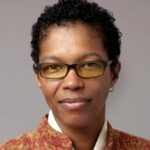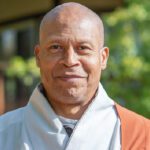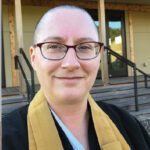Question: Zen teachings speak of the importance of not knowing, or “don’t know mind.” Trying to stay with that mind has been a powerful practice for me—more than once, it’s kept me from jumping to an incorrect assumption or unskillful action. But at some point, don’t we also need to do something? What’s the threshold for saying, “I know I don’t know, but I know enough to draw a conclusion and act on it”?
Rev. angel Kyodo williams: Much is made of the Zen exhortations to not know, to not do, to take the approach of “Don’t just do something, sit there.” Therein lies the clever sleight of mind of Zen as not just a practice, but as Way.
The point of the seemingly endless practice of restraint of mind is to allow its most organic expression to arise. In this instance, some might use the word “natural,” but I think this is unfitting of the alchemical process that unfolds when “don’t know mind” meets “must do something.”
The fact is that our subjective, comparing mind has no idea what to do in situations it has never encountered before—and, conversely, sometimes has too many ideas despite having no true reference point. When confronted with the unknown, those of us who have not trained our minds enter a reactive state in which panic, aggression, or indecisiveness overtake us. In order to avoid such feelings of being overwhelmed, our minds seek out confirmation of our preexisting ideas rather than tolerate the discomfort of not-knowing.
When action organically arises, we can get out of the way when necessary.
The practice of “don’t know mind” is not so much a practice of not knowing as it is a practice of not knowing. We practice tolerating this discomfort over and over again so that we no longer (or less often) impulsively react to the discomfort itself. Without practice, even if our actions end up being “right” in a given situation, what we are acting on is, in fact, aversion to our own discomfort, also known as fear. My favorite line of the Heart Sutra tells us to practice “with no hindrance of mind. No hindrance, therefore no fear.” When we meet our discomfort, we dissolve any hindrance to the reality of the moment and all the information it has to offer.
At the same time, our discomfort sometimes helps check our behaviors against internalized codes of conduct. A critical aspect of being a socialized human is feeling uncomfortable about committing acts that are outside the bounds of decency or that cause harm. Meeting our discomfort without an ethical grounding can render us unfeeling. Simply put, without a heart that abides in moral principles and the felt sense of accountability that comes with it, we become inhumane.
To practice—to live into—the Zen teaching of “don’t know mind” until it becomes Way is not some philosophical exercise or story of dead wise masters to replicate; rather, it is direct experience, and as a result, incontrovertibly direct expression. It is taking action that can be done by no one except you in that very moment—and as such, it can never be done again. This Way is embodiment personified.
So when action organically arises, we can get out of the way when necessary, having generated enough tolerance of not acting or needing action to be conclusive. It just is what it is. Just action. Just this moment. And the next. And the next—without fixation on the action, the actor, or even the results. When such action is ethically grounded in meeting experience directly, we can’t help but bring the heart of the whole world. We are without fixation, and yet we are accountable for every action we take. Organically arising. Wholehearted. Being and doing the best we can.
Jyoshin Clay: Yes, at some point we do need to do something. Life is not a static state. It is entirely possible to carry your “don’t know mind” into action. “Don’t know mind” and action are not mutually exclusive.
“Don’t know mind” is a mind that is present, attentive, alert, and curious. It asks, What is this? Action is simply the performance of a task.
How do we know when it is time to act? This can be tricky. So much depends on context. Yet several key things may be helpful when addressing such questions.
Having a stable meditation practice is important. A regular sitting practice can provide the skills to examine the impulse to act as it arises. Perhaps you might ask yourself: what is my motivation toward action? Am I wanting to change something? Am I wanting to help someone? What is my intention? What is the shape of this particular impulse to action? Does it come from a place of compassion? Is it aligned with the bodhisattva precepts? Even if you do not have essay-length answers to all of these questions, looking at them can provide insights into how to move toward skillful action.
Ultimately, you will have to find your own threshold regarding when and how to act.
Shifting focus from the motivations for action to the consequences of action: are you able to let go of wanting to achieve specific results and cultivate curiosity about how it might turn out? Can you carry that “don’t know mind” with you into the doing of the action itself, asking, as each moment arises, “What is this?” Also, are you willing to accept the karmic consequences of your actions?
It is important to keep the three poisons in mind. Greed, hatred, and delusion are powerful and can distort attempts at skillfulness. Sometimes it is helpful to run your ideas by someone you trust, such as a friend or a dharma teacher, especially if your impulse to act is outside of your normal patterns.
Having a mind and body that is rested and resourced helps when trying to discern what to do or when to do it. It may seem like stressful conditions provide the best motivation; however, a stressed-out, reactive response usually is not the most skillful—and neither is being paralyzed by indecision or doubt.
Ultimately, you will have to find your own threshold regarding when and how to act. It may look different for you than for those around you. It may take some experimenting to figure out the discernment process that works for you. As you become familiar with and clarify your mental processes, you will know when it is time to move toward action. You’ll notice a different quality in the feeling of motivation. Trust yourself and your wish to live your life with good intentions.
Kwan Haeng Sunim: Thank you for your question. Sometimes we have a question that does not have a clear answer and our thinking mind just recirculates the question over and over without ever reaching a conclusion. When we do finally settle on an answer, it can have more to do with our mood in that moment than what is really called for. Another way to get an answer is by using your “don’t know mind” to answer a question. Your “don’t know mind,” intuition, or your “gut” feeling are different names for the same thing. The question can be simple, such as what color should I paint my room, or should I go to the company party? Or it can be a bigger question, such as should I get married, or should I quit my job and move to another state? You can use your “don’t know mind” for any of these questions. You may find it easier and more helpful to not use “I” when referring to your “don’t know mind.” Your “don’t know mind” comes before the concept of “I.”
Your ‘don’t know mind’ will not always give you the answer you think it should.
If you have to make a decision fairly quickly and looking at the facts does not give you an answer, then rest your thinking mind and allow your “don’t know mind” to give you an answer. Go for a walk or make yourself busy with some other tasks, and after a while bring up the subject in your mind without thinking about it. Just look at it. Does some answer appear? If so, that would be your answer from “don’t know mind.” Sometimes the answer appears and you aren’t sure it’s the right one, so you begin to think about it. Then you are back at square one. There are times when you just have to have faith in yourself and go for it. Your “don’t know mind” will not always give you the answer you think it should.
If the question is important and perhaps even life changing, it’s best to first reflect on it intensively with your thinking mind. If after a few days or even a week you don’t have an answer, then put the question aside. Go about your daily routine, spending as little time as possible thinking about the question. Then one day (it might take a week), without warning, the answer will appear. When that happens, there is no doubt that the answer is coming from your “don’t know mind.” I hope this helps.



